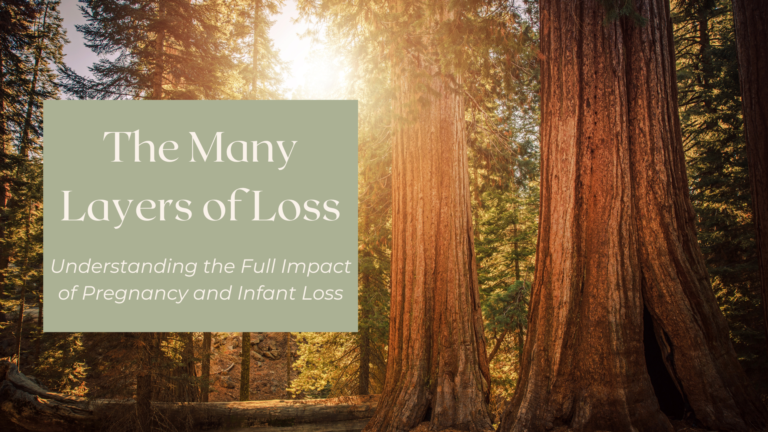What to Expect After A Miscarriage: A Complete Guide
First of all, I want to say I am so sorry for your loss. No one should ever have to endure this type of pain, but know that you are loved and your baby is loved.
Experiencing a miscarriage can feel overwhelming and confusing. This guide will help you understand what to expect physically and emotionally after pregnancy loss, while offering hope and support for the journey ahead.
What is a Miscarriage?
Miscarriage, also called early pregnancy loss, happens when a pregnancy ends on its own before 20 weeks. Medical professionals estimate that 10-15% of known pregnancies end in miscarriage, though the actual number may be higher since many occur before a woman knows she’s pregnant. Most miscarriages occur due to chromosomal abnormalities where the baby is not viable.
This is a common experience, with up to ¼ of women experiencing the loss of a baby in their lifetime. But knowing the statistics doesn’t make it any less painful when it happens to you. Each loss is unique and significant, regardless of how early it occurs.
Three Treatments After Early Pregnancy Loss
After a miscarriage is diagnosed, your doctor will discuss three main treatment options. Here’s a rundown of the options:
- Natural miscarriage: This means waiting for your body to complete the miscarriage on its own. During this process, you might experience cramping similar to strong menstrual cramps for some and labor for others. You will likely experience heavy bleeding with clots. This process typically lasts 2-3 weeks, although bleeding should not be heavy for the entire time. Natural miscarriage requires regular monitoring by your healthcare provider.
- Medical management: This option involves taking medication to help your body complete the miscarriage. This usually results in stronger cramping than natural miscarriage and heavier bleeding, but the process is usually complete within 24-48 hours. You’ll need a follow-up appointment to confirm completion.
- Surgical management, known as a D&C (dilation and curettage): This brief surgical procedure takes place under anesthesia and is usually completed in less than 30 minutes. While it requires a short recovery time, it allows for immediate completion of the process.
Whatever you choose to do, make sure to discuss all of the options with your doctor so you’re able to make the best choice for you and your baby. There are positives and drawbacks to each, and it’s important to be well-informed. If you wish to see your baby, this is an option for whichever route you choose although you may need to let the doctor know of your wishes beforehand if you’re having a D&C.
How Do You Know if You Have an Incomplete Miscarriage?
An incomplete miscarriage occurs when some, but not all, of the pregnancy tissue has passed from the uterus. This is occasionally a concern for women experiencing miscarriage, and recognizing the signs is important for your health and recovery.
Signs and Symptoms to Watch For
The most common signs of an incomplete miscarriage include:
- Prolonged bleeding – Heavy bleeding that continues beyond two weeks may indicate retained tissue
- Severe or persistent cramping – Pain that doesn’t improve or becomes worse over time
- Large clots – Passing very large blood clots (larger than a lemon)
- Foul-smelling discharge – This could indicate an infection
- Fever – Any temperature above 100.4°F (38°C)
- Continuing pregnancy symptoms – Such as breast tenderness or nausea that doesn’t subside
When to Seek Medical Attention
It’s important to contact your healthcare provider immediately if you experience:
- Heavy bleeding that soaks through more than one pad per hour for two consecutive hours
- Severe pain not relieved by over-the-counter medication
- Fever, chills, or signs of infection
- Dizziness or fainting
- Foul-smelling discharge
Every woman’s experience with miscarriage is different. Trust your instincts—if something doesn’t feel right or you’re concerned about your symptoms, don’t hesitate to contact your healthcare provider.
How Long Does it Take to Heal After Miscarriage?
Physical recovery from miscarriage varies for each woman. Bleeding may last 1-2 weeks, while cramping usually subsides within a few days. Hormone levels typically return to normal within 4-6 weeks, and your first period usually returns in 4-8 weeks. Remember, this can vary widely based on whether or not you had normal cycles before your pregnancy.
Your body will need time to heal, and you might experience breast tenderness that gradually decreases, fatigue and low energy, and continued pregnancy symptoms that slowly fade. Most women can resume normal activities when bleeding lessens.
Emotional recovery follows no set timeline. You might experience waves of grief that come and go, feelings of emptiness, mood swings as hormones adjust, and anxiety about future pregnancies. All of these feelings are normal and valid parts of the healing process.
How Long Will My First Period Last After Miscarriage?
Experiencing your first period after a miscarriage can bring mixed emotions – perhaps relief that your body is returning to normal, anxiety about what to expect, or even renewed grief.
Your first period after miscarriage will usually arrive about 4-6 weeks after your loss, though this timeline can vary significantly based on individual factors. As for duration, most women find that their first post-miscarriage period lasts between 5-7 days, similar to their normal periods before pregnancy. However, it is very common for your period to be heavier and more painful than normal.
It’s important to understand that this first cycle may be different from what you’re used to experiencing.
When Can You Get Pregnant Again?
Medically speaking, most doctors recommend waiting until you’ve had at least one normal period and physical recovery is complete, which usually takes 4-6 weeks. They’ll also want to ensure you feel emotionally ready and will need to get their approval.
However, the decision about when to try again is deeply personal. Some couples need more time to grieve and heal, while others feel ready to try sooner. There’s no right or wrong timeline – it’s about what feels right for you and your partner.
How to Process Grief After Miscarriage
Grieving a miscarriage can be particularly complicated because others might not understand the depth of your loss. While there are many women who have experienced this type of loss, there are many more who haven’t. This can make it difficult to relate to others during the most difficult days.
There are few tangible memories to hold onto, and the loss often feels invisible to others while you’re dealing with both physical and emotional pain. Acknowledging your loss is an important first step – give yourself permission to grieve, name your baby if you wish, and remember there’s no “right” way to feel or process your feelings.
Sharing your story can be healing. Consider talking with understanding friends and family, joining a support group, or connecting with others who have experienced loss. Professional counseling can also provide valuable support during this time. Taking care of yourself is crucial – rest when needed, accept help from others, and be patient with your healing process.
Many find comfort in honoring their baby’s memory through meaningful actions like planting a tree or garden, keeping a journal, or making a charitable donation. It’s also important to care for your relationship during this time. Communicate openly with your partner, remember that everyone grieves differently, and seek counseling if needed.
Related Post: The Different Faces of Grief: Understanding How Couples Grieve the Loss of a Baby
When to Seek Additional Support
During this time, watch for signs you might need additional support, such as persistent feelings of hopelessness, difficulty with daily tasks, isolation from others, or anxiety about the future. If depression lasts more than two weeks, never hesitate to reach out for professional help. Many counselors specialize in pregnancy loss and can provide valuable support during this journey.
If finding a therapist seems daunting, there are many online support groups available. If you haven’t already, check out the Miscarriage and Pregnancy Loss Group here. It’s free to join, and you’ll find many women in the group who have had the same experience you have.
While the pain of miscarriage may never completely disappear, many women find that with time and support, they can hold both grief and hope, honor their baby’s memory, find meaning in their experience, and move forward while remembering. Your grief is valid, your baby matters, and you’re not alone in this journey. Take the time you need to heal, both physically and emotionally, and don’t hesitate to reach out for support when you need it.







